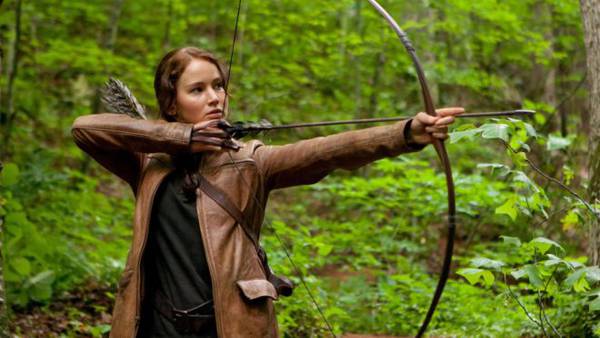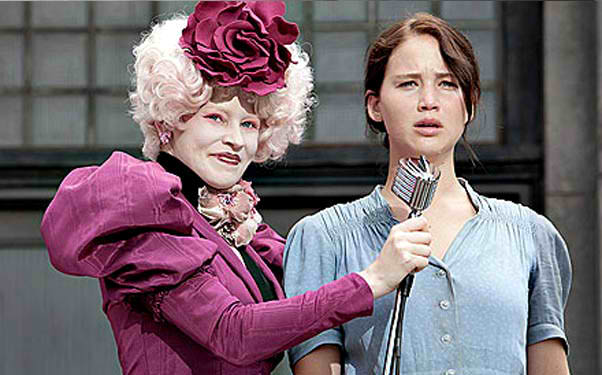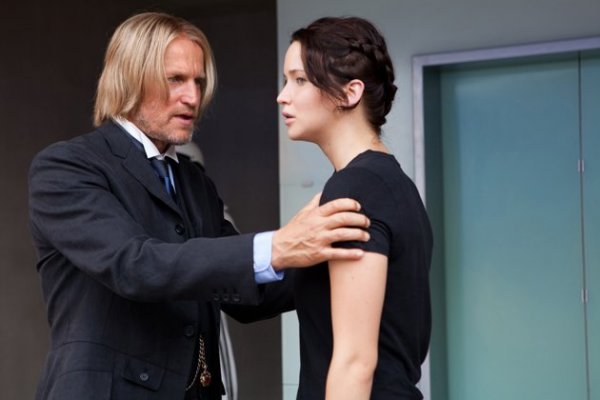Review: The Hunger Games
The hype, the fan base, the skeptics—the skeptics created by the hype and the fan base—all of these make adapting an insanely popular novel anything but easy. Given the breadth of the age and gender demographics that Suzanne Collins’ young adult science-fiction story “The Hunger Games” has reached, there are so many niches to please. You have older males intrigued by the dystopian vision and unabashed violence and the younger females inspired by Katniss Everdeen and moved by the story’s many tender relationships (and vice-versa to be certain).
“The Hunger Games” is without question a success, but a success can be measured in so many ways. An adaptation can be a success through faithfulness to the source material (aka by not screwing anything up) and pleasing the core fans (that would be “Twilight”). It can be determined by box-office success (also “Twilight”) or by taking risks in order to create a unique film experience and widen its appeal. Director Gary Ross’ vision for “The Hunger Games” checks off all of the above, and the secret is the film’s total and undying devotion to its leading lady.
Katniss (Jennifer Lawrence) lives with her mother and younger sister Prim (Willow Shields) in District 12, one of a dozen in the nation of Panem, a dictatorship built on the ruins of North America. She’s the family breadwinner, quite literally, as her hunting skills allow her to feed her family and trade for whatever else they need. She’s torn from them, however, when, in order to protect Prim, she volunteers to represent District 12 in the Hunger Games, a televised fight to the death that serves as an annual reminder of the Capitol’s hold on its people.
In many ways, the role echoes Lawrence’s Oscar-nominated performance in “Winter’s Bone,” and Ross’s camera treats her in ways similar to that drama. She’s fierce, independent yet a bit emotionally volatile, a survivalist as well as a nurturer. Ross recognizes the complexity Collins infused in her literary heroine and approaches the film as a character study. Rather than pristinely framed shots, Ross opts for mostly handheld camerawork throughout the film, especially in the beginning, as if trying to document Lawrence’s performance in order to access Katniss’ emotions and the roller coaster they endure.
The film takes its time in the beginning with this naturalistic approach and it makes the buildup to the games essentially better than the payoff. Those who have read the book countless times and no precisely what’s coming next will still find themselves enrapt by the suspense. The Reaping, the scene in which the District 12 tributes are chosen, is executed breathlessly, especially considering that from the movie’s opening minutes the outcome is about as obvious as putting a match to flint.
During the steady climb to the arena, Ross gives us as much time to get used to the world of the Capitol as Katniss receives in the story. Although our natural curiosity creates the desire to become fully immersed in this world of colorful makeup, bizarre fashion and extravagant dining, Ross refuses us. He aspires to preserve the feelings of total displacement that Katniss experiences, for it to seem as weird to us as it does to her. The choice is a risky one for folks unfamiliar with the book, which delves deeper into Katniss’ makeover, but the script, which Ross, Collins and Billy Ray (“State of Play,” “Flightplan”) collaborated on, finds ways to paint that picture through expertly crafted dialogue delivered by outstanding supporting actors.
Effie (Elizabeth Banks), Haymitch (Woody Harrelson) and Cinna (Lenny Kravtiz) are spot-on with their performances, despite being criminally under-explored. We like the honest and gentle Cinna, for example, but we don’t get to understand why he cares for Katniss and Peeta (Josh Hutcherson). Banks’ bubbly Effie gives us a taste of the Capitol’s ignorance, but she’s otherwise relegated to comic relief. As for Harrelson as drunken mentor Haymitch, he gets some of the best lines in the entire film, ones that somehow weaving together wit with exposition, but in a flash he goes from morally questionable to lovable ally. It would seem these are the sacrifices of making a genre film with such a complex main character.
As for the Games, Ross amps up the guerilla style in order to continue our experience of Katniss’ emotions. Scenes including Peeta, therefore, offer a welcome change of pace, pulling us out of the Katniss vortex. By association, Hutcherson gives a likable performance and Hutcherson’s interpretation is so convincingly like that of Peeta in the novel.
Shaky-cam also offers a great way to distort teen-on-teen violence for the purposes of a PG-13 rating. Although the deaths are still startling, the lack of blood or really any bare-knuckle grittiness makes the action scenes rather uneventful and mostly mutes the emotional impact. Collins’ descriptions in the book are infinitely more terrifying. Although the squeamish could care less, the prospect of facing death in the arena as well as the horrific notion that any world would take pleasure in fashioning and consuming this mass homicide almost never come to conscience. The choice to glaze over death is certainly not an artistic but a financial one, which as a fan is a tough pill to swallow. At least the devotion to character makes up for it.
Violence and supporting character development are the chief sacrifices, but they are not martyrs. They were decisions made knowing the result would bring one of the strongest young-adult heroines (and frankly, heroes) to grace the screen in some time. Even the romance is downplayed (for this movie) in order to set the stakes for the brewing sense of revolution that determines the trajectory of the rest of the series.
“The Hunger Games” proves that one of the few things that books and films have in common—characters—lie at the heart of a successful adaptations. The film’s devotion to re-creating the book’s first-person perspective (without the use of narration) sets it apart. Ross and company bring us into the world of the books with an artistic flair that outdoes every first installment of a high-profile adaptation, a vision that does not succumb to the task’s infinite pressures. Happy Hunger Games indeed.
4/5 Stars
The Hunger Games
Directed by Gary Ross
Written by Gary Ross, Suzanne Collins and Billy Ray
Starring: Jennifer Lawrence, Josh Hutcherson, Woody Harrelson, Liam Hemsworth








0 Comments
You can be the first one to leave a comment.